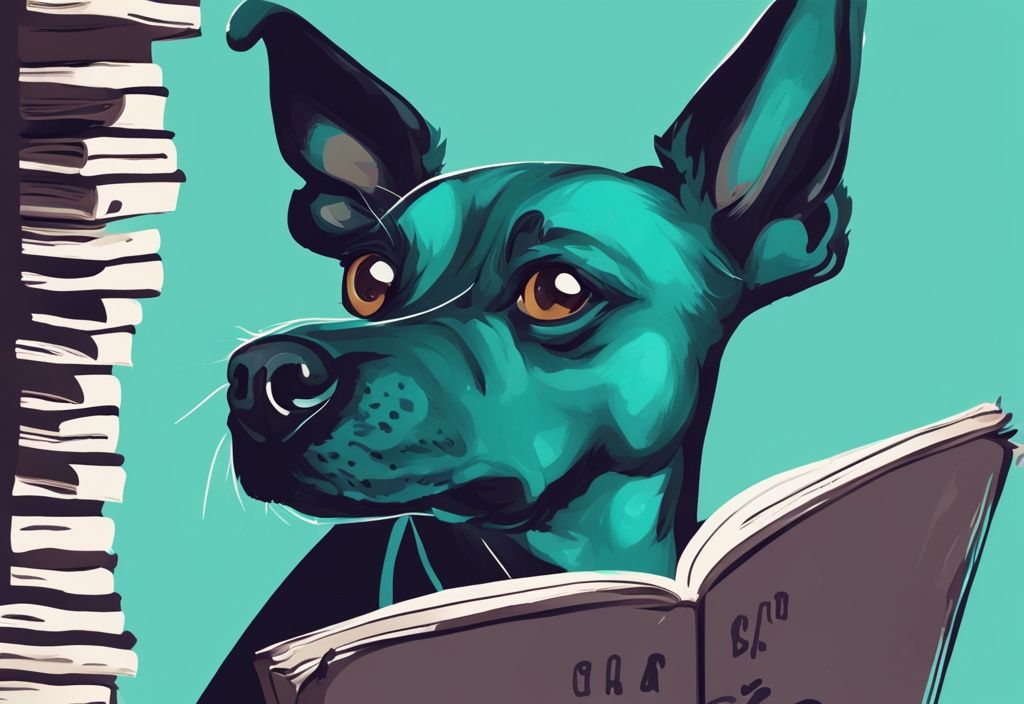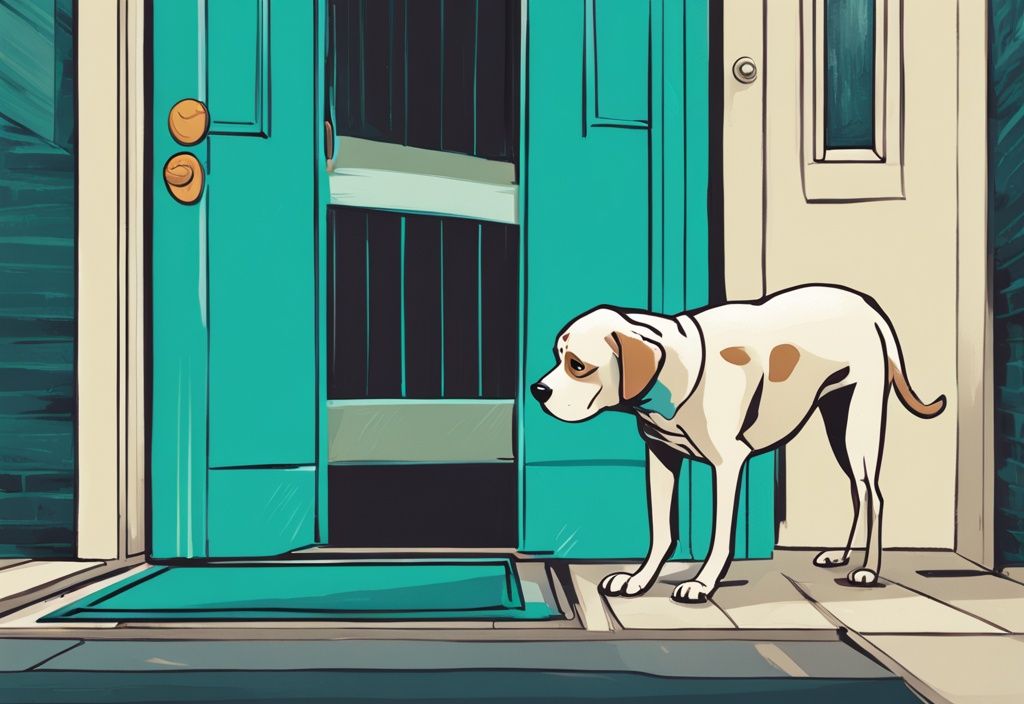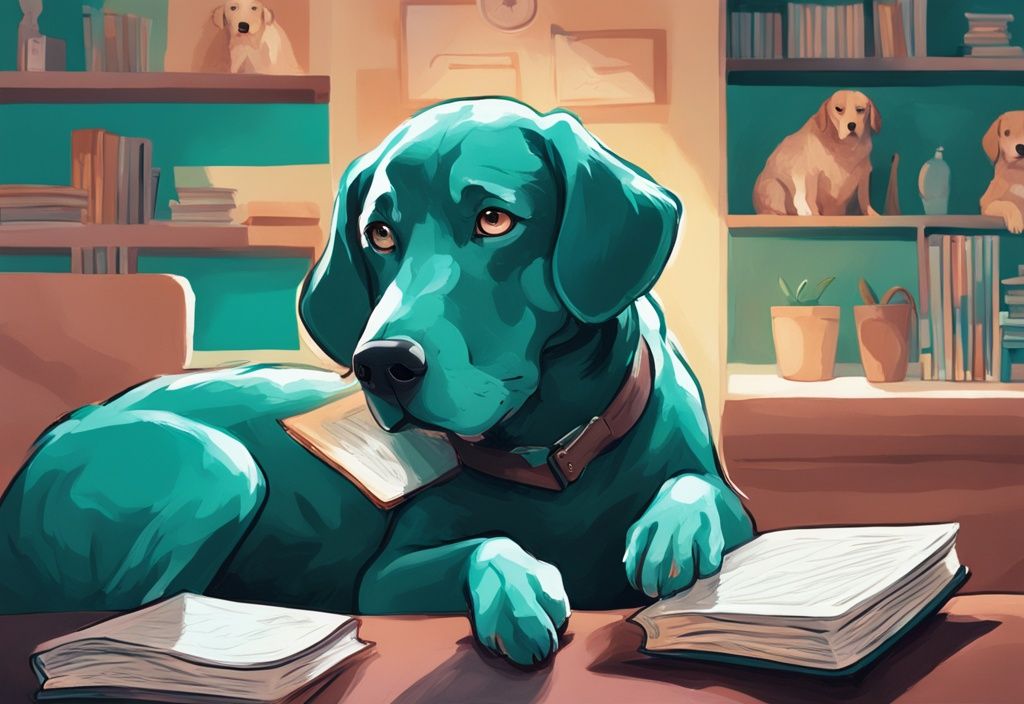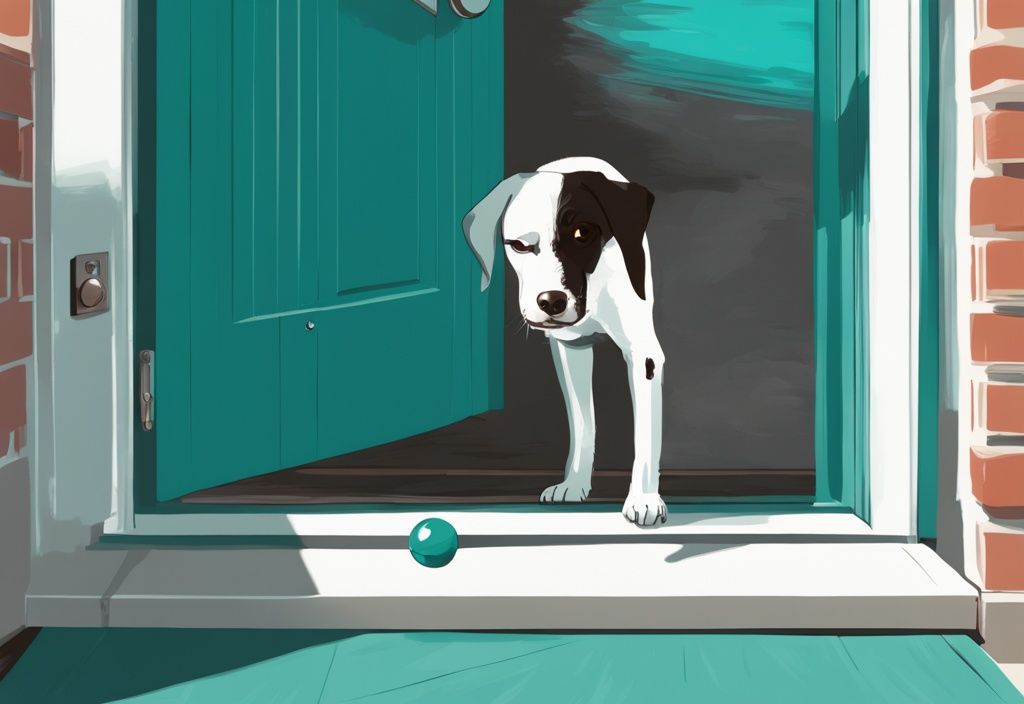”
Oops! Did you just call your beloved pooch dumb? I understand, we’ve all had those moments. But have you ever wondered if perhaps we’re the ones misunderstanding our little tail-wagging friends?
Let’s embark on the journey together with your confused Max or energetic Whiskers, and explore what’s really going on in their adorable canine brains. We’ll decipher breed-specific traits, assess environmental impacts, and discuss the vital role of good ol’ fashioned training.
Ready to dispel some doggy doubts and discover the hidden Einstein in your pup? Let’s dive in! You’ll soon realize your dog is far from dull and is simply paw-some in its unique way.”
Why Is My Dog So Dumb
Misinterpreting Dog Behavior
Does your furry friend sometimes seem like they’re in their own world, leaving you wondering, “Why is my dog so dumb?” This often comes from misinterpreting their behavior. More often than not, it’s tied to boredom or lack of engagement. Imagine spending a whole day with nothing to do—of course, you’d appear disinterested! Dogs are similar. Without mental and physical stimulation, they can look disconnected. It’s all about understanding their antics. Take tail-chasing or getting stuck in funny spots—it’s usually playfulness or curiosity, not a sign of low intelligence.
Remember my Border Collie, Max? One day, he spent an hour chasing Whiskers’ shadow. Was it silly? Absolutely. Was it because he’s “dumb”? Not at all. Max is just playful and curious—two traits that make him the lovable goof he is. It’s key to understand our pets fully; misinterpretations can lead to unfair judgments.
Breed-Specific Traits and Intelligence
Every dog breed has its quirks, and that extends to how they learn and interact. Some breeds, like German Shepherds, Poodles, and Border Collies (yep, Max’s cousins!), are naturally more trainable due to their genetics and history. These brainiacs love tasks—retrieving, herding, or guarding light up their days. They need consistent activities to burn their energy and keep their smart brains busy.
On the flip side, breeds like pugs, beagles, and mastiffs have their own special traits. Sure, they might be harder to train, but that doesn’t mean they’re “dumb.” They simply have different motivations.
For instance, Beagles have an incredible nose for scents. Sometimes, their sniffing adventures lead them away from training focus. It’s essential to understand and appreciate these quirks.
So, next time you’re scratching your head wondering, “Why is my dog so dumb?”—remember it’s usually the human who needs to decode the dog’s language. Because when we get on their wavelength, we see they’re not dumb at all—just wonderfully unique.
Understanding Canine Intelligence
Ever wondered why is my dog so dumb? Well, let’s dive into the fascinating world of canine smarts! We often mistake obedience for intelligence, but there’s a whole lot more to a dog’s brainpower than just sitting or staying on command. Canine intelligence is a delightful mix of problem-solving skills, emotional insight, navigation abilities, and those instinctual behaviors that make dogs, well, dogs. Each furry friend has their own combo of these talents, making them unique in ways that go beyond simple labels like “smart” or “dumb.”
Defining Dog Intelligence
Let’s start with creative intelligence. You know, like when Max, my Border Collie, figured out how to open the cupboard to get his favorite treats. Clever boy! But that’s just one aspect. Emotional intelligence shines through when dogs read your mood and offer that perfect snuggle just when you need it. And don’t get me started on their navigation skills—ever been amazed at how your pup can always find the way back home? That’s their internal GPS at work. Then there’s hunting intuition—those keen instincts polished over generations, from retrieving ducks to, um, “retrieving” your slippers.
Comparing Canine and Human Intelligence
So, if you’re scratching your head and thinking, why is my dog so dumb, remember that dogs process the world differently than us. Sure, Max won’t be solving algebra problems any time soon, but his strengths lie in his super-charged senses and his incredible ability to bond with us humans.
When we talk about canine intelligence, it’s important to acknowledge their different strengths and weaknesses. Sometimes, what looks like “dumbness” is just a mismatch between our expectations and their natural skills. For instance, Max’s quickness to learn a new game versus his absolute bafflement at catching a ball mid-air—both are reflections of his kind of brilliance. Think about their sharp noses and their knack for understanding our body language—those are smarts if ever I’ve seen them!
Factors Affecting Dog Intelligence
Curious about the factors shaping why is my dog so dumb? It’s a blend of genetics, environment, and upbringing. Different breeds have different strengths; some pick up new tricks in no time, while others need a bit more patience and practice. With consistent training and lots of love, even the “slow learners” can surprise you!
Age plays a part too. Puppies are cute, but their wiggly little bodies are often all over the place because they’re still learning. Adults, like Max, might take a bit longer to learn new tricks, but with the right motivation (treats, anyone?), they can do wonders. And let’s not overlook the role of social interactions. Playing with other dogs and humans does wonders for a dog’s mental growth. So, if you keep them stimulated and engaged, you’ll see their true potential shine.
Each pooch is unique, even within a breed. Max might excel at agility courses, while the neighbor’s dog might ace scent work. Embracing and nurturing these individual quirks not only debunks the “dumb dog” myth but also brings out the best in your furry friend. So next time you find yourself asking why is my dog so dumb, remember—their intelligence might just be different from your expectations, and that’s perfectly okay.

How Your Canine’s Environment and Social Interaction Can Influence Their Behavior
The Impact of Environment on Dog Behavior
One common question that pops into our minds is, “Why is my dog so dumb?”. Quite often, the answer lies not in your dog’s inherent intelligence but in the environment they live in. Dogs, much like us humans, are shaped by their surroundings. Picture this: an environment bursting with stimuli encourages curiosity, learning, and engagement. On the flip side, a dull and unstimulating environment can lead to behaviors that we might mistakenly interpret as lack of intelligence. For example, if your dog is chewing on furniture or barking non-stop, it could simply be a reaction to environmental stressors or boredom, not a sign of low intelligence.
Creating an enriching environment for your dog is like setting up a magical kingdom full of adventures. Think toys, puzzles, and regular playtime—these keep your dog’s mind buzzing with activity. Additionally, if your pup is experiencing skin discomfort, you might find relief by trying a homemade anti-itch spray for dogs to soothe their skin naturally. Introducing frequent changes and offering new experiences also contribute to a stimulating environment that boosts cognitive function. Suddenly, the question switches from “Why is my dog so dumb?” to “How can I make my dog’s environment more exciting?”
The Role of Social Interaction in Dog Intelligence
Let’s not forget the other half of the equation—social interaction. Dogs are social creatures by nature. If they lack engagement, we might perceive them as “dumb.” Picture this: a dog that doesn’t follow commands or seems to misbehave. They might just be craving social interaction and attention. So, when wondering why your dog may seem so dumb, consider that it’s probably a reflection of unmet social needs.
Think of social interactions as little brain boosters for your dog. Regular playdates with other dogs, trips to the dog park, and interactive games work wonders. These activities alleviate boredom and channel your dog’s energy into positive behaviors. By fostering a vibrant social life for your pet, you’ll see a significant improvement in their responsiveness and overall behavior, dispelling any myths about their intelligence.
Importance of Proper Socialization
Socialization is another cornerstone when addressing why some dogs might seem “dumb.” Dogs that haven’t been adequately socialized during their formative years often display fear, anxiety, or inappropriate behaviors in new settings. This can lead to the misconception that the dog lacks intelligence. For instance, a dog that cowers or acts aggressively in unfamiliar situations usually reacts out of confusion and fear, not lack of intelligence.
Socialization is like opening a world of confidence and competence for your dog. Exposing them to various environments, people, and other animals from a young age plays a crucial role. This exposure develops the skills they need to navigate different situations confidently. A well-socialized dog is more likely to display behaviors that reflect their true smartness because they feel secure and understood. So, instead of asking “Why is my dog so dumb?”, the more fitting question becomes “How can I better support my dog’s social growth?”
In conclusion, understanding the immense impact of environment and social interaction on your dog’s behavior helps answer many concerns about perceived intelligence. Enriching your dog’s surroundings and providing ample social opportunities will not only enhance their cognitive abilities but also foster a happier, more responsive pet.
Does Boredom Make Your Dog Seem Dumb?
Ever feel like your dog has gone from Einstein to Goofball overnight? Well, let’s dive into what’s really happening. Spoiler alert: Your pup isn’t actually getting dumber!
Common Signs of Under-Stimulation
Is your dog constantly engaging in random behaviors that seem hard to explain? You may find yourself wondering, “Why is my dog so dumb?” However, these behaviors often stem from under-stimulation rather than a lack of intelligence.
Common signs that your dog is under-stimulated include random barking, chewing on household items, excessive jumping, and pacing. When dogs bark at inappropriate times, it often signifies a lack of social interaction or insufficient physical activity. Chewing on furniture, shoes, or other items can be a clear indication that your dog is lacking suitable toys and is trying to find ways to entertain itself.
Boredom-Related Behaviors
Attributing your dog’s inattentiveness or seeming clumsiness to lack of intelligence might seem logical, but such behavior is often tied to boredom. Misbehaving to get attention is a common reaction in bored dogs. When dogs do not respond to commands, it’s frequently because they are not mentally engaged or are seeking stimulation in improper ways.
The result is behaviors that seem uncoordinated or uninterested, making them appear “dumb” to an untrained eye. Understanding these nuances can help you address the root of the issue effectively and improve your dog’s communication skills by learning to read their body language, which is crucial for fostering a better relationship with your furry friend. For more insights on this topic, check out this guide on how to read dog body language.
How Under-Stimulation Affects Learning
Under-stimulation can severely impact your dog’s ability to learn. A dog deprived of mental and physical stimulation may exhibit impaired cognitive function, making it harder for them to pick up new commands or tricks. Regular engagement in enriching activities is crucial for boosting your dog’s cognitive abilities.
Providing mental challenges, such as puzzle toys and interactive games, alongside regular physical exercise, can enhance your dog’s learning capacity. Therefore, addressing the question “why is my dog so dumb” often boils down to ensuring your pet receives adequate stimulation.
Unleashing Your Dog’s Intelligence Through Training
Training your furry friend isn’t just about obedience—it’s about unlocking their potential and making your life together even more delightful. Let’s explore how you can nurture your dog’s intelligence through some pawsome training techniques!

Importance of Positive Reinforcement
Ever wondered why is my dog so dumb? One way to tackle this thought is through the magic of positive reinforcement training. Picture this: Max, my Border Collie, eagerly wagging his tail as he sits on command because he knows a treat or his favorite toy follows. Positive reinforcement makes learning an adventure! By rewarding desirable behaviors, you’re not just teaching commands—you’re building a stronger bond full of cooperation and joy. The moment your dog links good behavior with delightful rewards, training sessions transform into fun, engaging experiences. With consistent practice, you’ll see a shift in your household dynamics, making it a happier and more obedient one.
Common Training Mistakes
Now, let’s talk about the kind of training mistakes that can make you think your dog isn’t the sharpest tool in the shed. Using negative reinforcement or punishments can spell trouble, leading to a rebellious, training-averse pup. Imagine trying to coach a player by only pointing out their mistakes—no one thrives in that environment! Instead, think of yourself as a team captain, working closely with your four-legged teammate. Misunderstanding or mishandling your dog can contribute to their seeming lack of intelligence. By avoiding these pitfalls, you can streamline the training process, boosting both compliance and cognitive skills.
Adapting Training Techniques to Your Dog’s Needs
Max loves fast-paced games, while Whiskers curls up during puzzle time. Just like our pets, every dog has unique needs that influence how they learn best. Tailoring your training methods to fit your dog’s individual strengths and motivations is key to improving their intellect. For example, keep the sessions short but exciting, and sprinkle in a positive vibe to achieve fantastic results. Understanding your dog’s breed-specific needs also plays a vital role. High-energy breeds might need extensive physical play, whereas others might shine in mentally stimulating activities. By adapting training techniques this way, you’ll effectively counter the stereotype of why is my dog so dumb, crafting a personalized and effective learning journey.
Health Issues that May Impact Your Dog’s Intelligence
Ever wondered, “why is my dog so dumb?”, when in fact, they might be struggling with underlying health issues affecting their smarts? This section delves into how health problems can influence your dog’s behavior and learning capacity, helping you understand what might be going on with your furry friend.
Common Health Issues Affecting Behavior
Many dog owners find themselves asking, “why is my dog so dumb?”, but the truth might be linked to health conditions. Medical issues can play a significant role in how a dog behaves and learns. Take vision problems, for example. If your pup can’t see well, they might have trouble responding to visual cues. Chronic pain is another culprit—imagine trying to learn new tricks when you’re constantly uncomfortable! It’s no wonder some dogs seem less engaged.
As dogs get older, hearing or vision loss becomes quite common, making it harder for them to follow commands or interact with their environment. This doesn’t mean they’re dumb; they’re just physically limited, and recognizing these issues can be the first step in helping them lead a happier life.
Neurological Disorders in Dogs
Sometimes, the reason behind a dog’s seemingly “dumb” behavior is rooted in neurological disorders. Conditions like Obsessive-Compulsive Disorder (OCD) or Canine Autism can make a dog act in ways that seem odd or less socially interactive. For instance, a dog with these disorders might struggle to process communication, follow commands, or stop repetitive behaviors.
These challenges can be tough, but they are manageable. Working with a skilled behaviorist who understands these neurological issues can make a world of difference. Tailored strategies and interventions can help these dogs improve their social skills, making them seem brighter and more engaged.
When to Consult a Veterinarian or Behaviorist
So, when should you really start worrying about why your dog might seem, well, “dumb”? If you’re concerned about your pup’s learning ability or notice unusual behaviors, your best bet is to consult a veterinarian. They can check for any medical conditions that might be affecting your dog’s behavior and learning.
For more complicated behavior issues, seeking advice from a specialized animal behaviorist can be incredibly helpful. These professionals can provide deeper insights and create tailored training plans to address specific problems, ultimately improving your dog’s cognitive and social interactions.
Ways to Improve Your Dog’s Learning and Engagement
Ensuring your furry friend is mentally and physically stimulated can significantly enhance their learning and overall happiness. Let’s dive into some playful methods to keep that tail wagging!
Tips for Mental and Physical Stimulation
- Providing engaging rewards is crucial for effective training. Some dogs, like Max, my curious Border Collie, may respond better to toys or playtime rather than treats. So, understanding what motivates your pet can make a significant difference.
- Enhancing core skills such as eye contact can dramatically improve your dog’s ability to focus. It’s quite similar to how Whiskers, my rescue cat, learned to communicate with gentle head butts and purrs. Consistent practice and reinforcement help build a strong foundation for more advanced training.
- Interactive games like puzzle feeders and agility courses can offer both physical exercise and mental challenges. These activities help keep your dog engaged and stimulate cognitive function. Picture Max solving a puzzle feeder—his excitement is contagious!
- Incorporate varied exercise routines, including both structured training sessions and free play, to prevent boredom and over-stimulation. Balanced physical activity supports overall mental well-being. Imagine alternating a brisk walk with some frisbee fun—pure joy!
Understanding Your Dog’s Unique Strengths
- Each dog has its own set of individual skills and abilities. Recognizing and understanding these unique strengths can significantly enhance your training approach and improve results. Think about Max’s obsession with herding anything that moves; it’s all about playing to their strengths!
- Different breeds have specific traits that can influence their learning styles. Tailoring your training methods to align with these breed-specific behaviors can lead to more effective learning experiences. For instance, Labradors often excel in water-based activities; it’s their happy place!
- Monitoring your dog’s responses to various training exercises can provide insights into their natural inclinations and preferred activities. This allows for more personalized and productive training sessions. If Max seems particularly keen on a game of fetch, that’s my cue to integrate it more often.
- Utilizing a dog’s inherent skills, such as herding in Border Collies or retrieving in Labradors, can make training sessions feel more intuitive and enjoyable for your pet. This aligns with their natural motivations and instincts, turning training into fun playtime.

Creating Effective and Engaging Training Sessions
- Maintaining a positive and consistent approach to training ensures that your dog remains enthusiastic and engaged. Positive reinforcement techniques like praise, treats, and playtime build a strong, cooperative relationship. I’ve found Max absolutely thrives on a blend of treats and enthusiastic praise.
- Providing clear, positive instructions helps avoid confusion and ensures your dog understands what is being asked. Consistency in commands and rewards fosters better learning and obedience. Just as Whiskers learned to come for dinner with a simple call, dogs too benefit from clear communication.
- Shorter, more engaging training sessions are often more effective. They keep your dog focused and prevent fatigue or boredom, making each session productive and enjoyable. Think of it like a quick but fun puzzle break—it keeps the mind sharp and spirits high.
- Involving varied activities and alternating between different types of training can keep the process stimulating. If you’re wondering why your dog is acting weird, it could be due to a lack of mental stimulation or boredom.
This diverse approach helps maintain your dog’s interest and promotes comprehensive learning. One day it’s fetch in the park, the next it’s a simple obedience drill at home—variety is key!
FAQ
Why does my dog ignore my commands?
Ever found yourself wondering, “Why is my dog so dumb?” You’re not alone! Dogs might ignore commands for a variety of reasons—boredom, lack of proper engagement, or even ineffective training methods. Imagine if you were asked to do the same boring task over and over; you’d lose interest too, right? Finding the root cause of your dog’s behavior can lead to more engaging and effective training strategies. Trust me, with the right approach, you’ll see improvement!
Can older dogs still learn new tricks?
Absolutely! Don’t believe the adage that you can’t teach an old dog new tricks. With a sprinkle of persistence and a dash of positive reinforcement, older dogs can indeed learn new things. They may need a bit more patience, but they’re still capable of absorbing new commands and skills. Just look at my Max, who learned to shake hands at the ripe age of nine!
Are some dog breeds naturally less intelligent?
It’s a common misconception that some dog breeds are less intelligent. Different breeds have unique needs and motivations, which can sometimes make training a bit more challenging. For example, while some breeds may not be as quick to learn standard commands, they often excel in other areas. It’s all about finding the right approach to tap into your dog’s potential.
What are some good ways to stimulate my dog mentally?
Mental stimulation is key to keeping your dog happy and alert. You can try a variety of activities like providing mentally stimulating toys, engaging in regular training sessions, and ensuring plenty of physical activities. These are great ways to sharpen your dog’s cognitive abilities. Think of it as working out a muscle—just one that happens to be furry and enjoys belly rubs!
Conclusion
So, why is my dog so dumb? Well, let’s navigate through this curious query! Sometimes, our furry friends get tagged as “dumb” simply because we don’t fully grasp their actions. Imagine Max, my Border Collie — if he gets too little exercise, he might seem out of sorts, but that doesn’t mean he’s not smart. Often, it’s under-stimulation, lack of training, or even health concerns at play.
Training is the cornerstone to unlocking a dog’s full potential. Picture this: a playful training session tailored to your dog’s quirks can transform their behavior. Every breed has its unique traits and may require different methods. Don’t worry if it seems tough initially; the right motivation and persistence can work wonders.
Positive reinforcement is pure magic! Rewarding good behavior with treats, attention, or snuggly toys isn’t just fun for your pup; it strengthens that special bond between you two.
Environment and health are also pivotal. A dog’s surroundings can do a lot to shape their behavior. The environment may even influence perceptions of what different dogs are capable of, leading to discussions about what is considered the scariest dog. Max thrives in a stimulating setting loaded with games and challenges. Conversely, an unstimulating or chaotic environment can make even the smartest dogs appear “dumb.” Regular check-ups with the vet ensure Max stays in tip-top shape, ruling out any health issues that could be holding him back.
Each dog is a treasure trove of unique abilities. The key is understanding and meeting their specific needs, ensuring they’re well-socialized, and maintaining a positive training routine. Next time you wonder, “Why is my dog so dumb?” remember it might just be a call to explore and understand their world a bit better.
With patience, a dash of humor, and lots of love, every dog can shine, showing off their wonderful, quirky intelligence.
